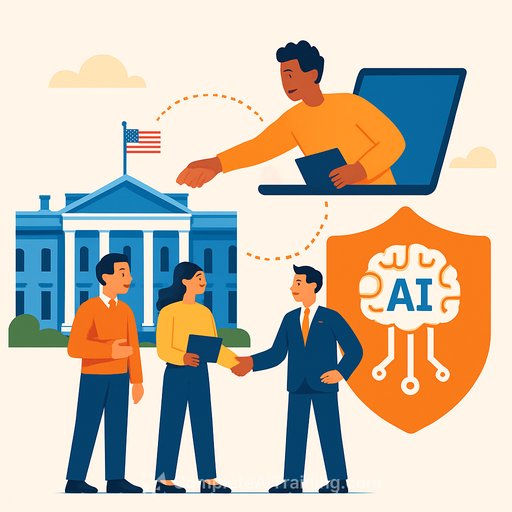Cyber Innovation Center Joins White House AI Education Taskforce Roundtable
Bossier City, La. – Kevin Nolten, president of the Cyber Innovation Center (CIC), participated in a White House roundtable focused on AI education, hosted by the First Lady of the United States. The discussion brought together senior leaders from multiple federal agencies to address how AI education can equip students with the skills needed for responsible and effective use of artificial intelligence.
The event included leaders from the Departments of Agriculture, Education, Energy, and Labor, as well as key figures from the Office of Science and Technology Policy, National Science Foundation, and presidential advisors on policy and AI. This collaboration highlights the urgency of preparing students for AI’s growing role in society and national security.
Why AI Education Matters
AI is increasingly used in areas like threat detection, incident response, and data analysis. At the same time, AI creates new challenges such as automated attacks, misinformation, and privacy concerns. The taskforce’s goal is to provide students with the knowledge to use AI responsibly while understanding its risks.
The Cyber Innovation Center supports these priorities through its workforce and academic initiative, CYBER.ORG. With over a decade of experience in cybersecurity education, CIC offers curriculum and training that lay the groundwork for students to explore AI and other emerging technologies safely and thoughtfully.
Building Skills Early and Ethically
"The CIC offers age-appropriate, ethical, and educationally relevant curricula that lay an early foundation and help build skills needed for emerging tech like AI," said Nolten. Integrating AI into classrooms ensures students understand both its potential and risks. This approach not only encourages curiosity but also strengthens digital literacy essential for future careers.
Meeting the Demand for Cybersecurity and AI Talent
The nation’s need for skilled cybersecurity and AI professionals is urgent. To respond, CIC and CYBER.ORG have reached more than 45,000 K–12 educators and 5.6 million students nationwide, including all 50 states and U.S. territories. Their work extends beyond K–12 education through partnerships with higher education and industry to build a strong talent pipeline.
In the next year, CIC plans to train 6,500 more educators, engage 1 million additional students, and conduct 250 professional development events. This ongoing effort supports the broader goals of the President’s Executive Order on AI and national security.
Preparing Students for an AI-Driven Future
The mission of CIC is clear: equip learners with the skills to use AI responsibly and defend against its misuse. Nolten emphasized that AI is both a critical defense tool and a potential threat, making AI education a vital part of cybersecurity training.
By focusing on practical, ethical AI education, CIC aims to produce a generation ready to pursue careers in cyber and emerging technologies, strengthening the country’s workforce and security.
About the Cyber Innovation Center
The Cyber Innovation Center, based in Bossier City, Louisiana, anchors the National Cyber Research Park and drives workforce development in the region. As a nonprofit, CIC fosters collaboration across government, industry, and academia to grow a sustainable, knowledge-based workforce.
Learn more at www.cyberinnovationcenter.org.
About CYBER.ORG
CYBER.ORG is CIC’s workforce and academic initiative advancing cybersecurity education from K–12 through higher education. Supported partly by the Cybersecurity and Infrastructure Security Agency (CISA), it delivers curriculum, resources, and educator training nationwide.
Focused on foundational skills in cybersecurity, AI, and computer science, CYBER.ORG has impacted over 45,000 educators and 5.6 million students across the U.S. It plays a key role in strengthening the future workforce and enhancing national security.
For details, visit www.cyber.org.
Your membership also unlocks:




